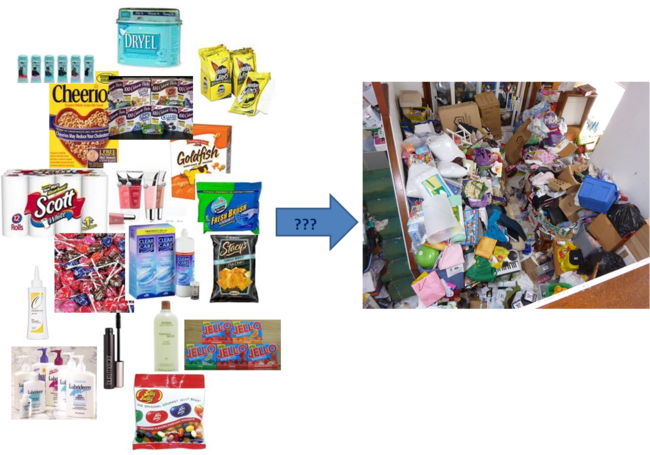Choice: Less Is More
 Thursday, April 7, 2011 at 21:03
Thursday, April 7, 2011 at 21:03 An expat's trip to the US is rarely a holiday or an opportunity to see somewhere new. It usually consists of (1) Visiting family and friends, and (2) shopping.
Each time I go home, my list of must-haves is smaller and smaller. In some cases, I've found reasonable substitutes here; in others, I've decided I just don't care so much anymore. Upon arriving home from 2 weeks in NY, I exclaimed to Herr J "But my bags were 8 kg below the limit...I could have fit so much more!" I guess this is a good sign...I've been working to deplete the stocks in my closet and I've realized there are only a few things I need from home.
 Still on the list...
Still on the list...
But what always strikes me is the sheer number of varieties of the same product. And I think it's gotten worse.
I have sensory overload when I go to CVS or Wallgreens (don't even get me started on Target!!). I just stand at the shelves with no idea what to buy because there are 28 different choices for each product, and I'm usually just thankful to find one of something where I understand what the product is! Now there are about 10 different varieties of Sudafed, plus an equal number of the store brand and 5 variations on how many pills in the box. Yet, they're pretty much the same - the good stuff behind the counter, or the weaker stuff on the shelf. Luckily I got to CVS an hour before closing.... I wanted to buy the classic St. Ive's Apricot Scrub, but now there are different formulations of it, plus the store brand. While of course I want to make my own decisions, I now see the space that advertising and magazines fill in trying to convince me what to buy!! If the marketing people weren't out there telling me how their product is differentiated from the others, how would I know what to buy?
The choice is just too much for me sometimes. And I'm realizing that a lot of things in life are like this.
For example, I've taken quite a few trips in the past month, and while I feel each time the packing is better, I still end up having packed things I never wear on a trip, and it's still a decision what to wear in the morning. I'm a pretty careful packer....I had a carryon and a half-empty small checked bag for a 2 week business trip. But still I had too much.
Our trip to Finland was an interesting experiment...Given that the temperature was mostly below freezing and the activities outdoors, the lodge provided clothing. Socks, boots, gloves, fleece, coats, hats - everything! All I packed for a 10 day trip was a couple of pairs of black leggings, 4 tops, underwear, a couple pairs of socks, a sweater, the boots I wore, and some warm long underwear. There was plenty of room left in my carry-on sized bag! The amazing thing was that I ended up with one shirt unworn. But even more amazing - getting dressed was so simple! With such a small range to choose from, life was much simpler.
A passage from Olivia Goldsmith's Fashionably Late struck me as quite true on many levels (including the impossible mission of returning anything in Europe!):
Karen had forumlated a few theories about why it was so hard for women to look comfortable and stylish. American women didn't know how to dress partly because they had too much. She remembered a French woman who had once visited Belle. Chic, elegant, and a Parisian attorney's wife, the woman had looked in Belle's closet with horror and asked: "But how can you dress well? You have too much to choose from!" As the brilliant shoe designer Manolo Blahnik had said, "It's all a question of selection, to choose less. That is something Americans do not understand. They think more is better."
Karen had observed that French women, even the middle-class ones, wore expensive clothes, but they had far fewer things than Americans and formulated their ensembles much more carefully. Of course, they learned the hard way not to make mistakes: it was next to impossible to return merchandise in Paris. Can you imagine the attitude?
The same happens here. It's changing with the advent of all the "disposable fashion" of H&M, Forever 21, and similar stores carrying low priced, trendy clothes. But in general, many Germans invest in a relatively small amount of quality clothing that will be wearable for many years. The German style is a little more classic (sometimes described as "boring") than the French (more feminine) or Italian (much more fitted, and on the flashier end of still being classic styling), but the attitude toward purchases is similar.
Even before this, I admit I have too much stuff. I have a bad habit of not wanting to throw out anything that is still functionable or wearable....though my definitions may be a bit skewed.... Also, I have almost 15 years of clothes suited to hot climates and driving everywhere. So realistically most of my clothes and almost ALL of my shoes were unsuitable for life in a cobblestoned city that has a long winter!
I've been trying to cut down and to also get rid of things that I don't or shouldn't wear. And to remember that when I replace something, I need to actually throw out the old one! I employed a new strategy during my trip to New York...I packed things that I really needed to throw out, and then I threw them out after wearing them. Socks with no elastic and small holes, too big underwear, and hair brushes that I had replaced because they were worn out (but still worked passably...). And throwing them out at the end cleared the way for chocolate chips and other goodies!
 Frau A ...
Frau A ...  5 Comments
5 Comments  Fashion, Style, & Shopping tagged
Fashion, Style, & Shopping tagged  expat life,
expat life,  life in the US,
life in the US,  shopping ...
shopping ...  Print Article
Print Article  Email Article
Email Article 




